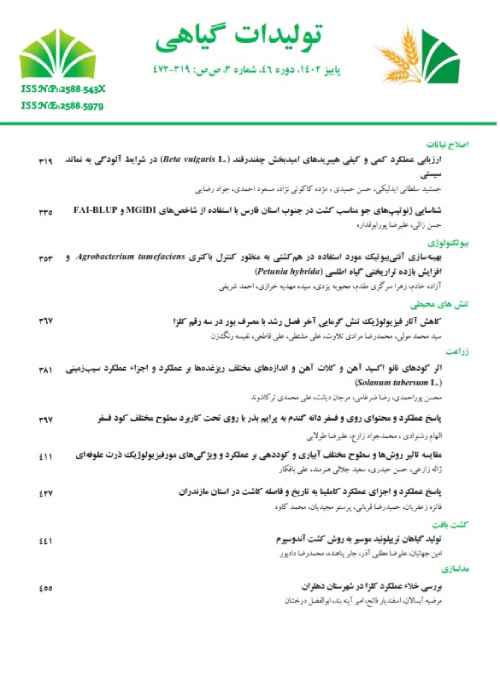The Effect of Plant Growth-Promoting Rhizobacteria Producing ACC-Deaminase, IAA, Siderophore and Phosphate Solubilization on Growth Indices, Chlorophyll, Proline and Protein in Alfalfa at Different Levels of Salinity
Introduction:
Agriculture practices involve the extensive utilization of chemical fertilizers that lead to several impacts, namely groundwater pollution, eutrophication, and production of greenhouse gases. These ultimately lead to environmental pollution and pose several health risks. With this respect, plant growth promoting rhizobacteria (PGPR) consist of a diverse collection of rhizobacteria that occur in the rhizospheric zone and interact with plant roots. Moreover plant growth promoting rhizobacteria (PGPR) are a heterogeneous group of bacteria found in the rhizosphere, associated with roots and root surfaces or living freely in the soil and influencing plant growth directly or indirectly. A large number of bacteria is reported to contribute to plant growth, including species of Pseudomonas, Azospirillum, Azotobacter, Klebsiella, Enterobacter, Acinetobacter, Alcaligenes, Arthrobacter, Burkholderia, Bacillus, and Serratia. Additionally, several reports indicate the application of ACC-deaminase-producing PGPR in facilitating plant growth and inducing tolerance in various abiotic stresses, namely (1) salt stress, (2) drought stress, (3) heat stress, (4) chilling stress, etc. The present study was performed to screen PGPR strains with different PGP traits in calcareous soils under salinity condition and to use such PGPR strains as biological inoculation.
Materials and Methods:
In this study, 45 rhizospheric soil samples were collected from different crops in agricultural farms and placed in plastic bags, and transported to a laboratory, where it was refrigerated at 4 ° C until further use. To obtain a solution of 10-4 to 10-6 dilutions, one milliliter of suspension was serially diluted and 100 microliters of this suspension solution were spread onto the sterile nutrient agar medium. plates were incubated at 28±2°C for 48 hours in a BOD incubator. Rhizobacterial isolates with a different morphological appearance and fast growth on agar plates were randomly selected and purified by repetitive streaking on the fresh medium. After purification, these PGPR isolates were screened for PGP traits. Isolates with phosphate solubilization, siderophore production, IAA production and ACC-deaminase production were screened and finally three isolates were selected for molecular identification and pot experiments.
Results and DiscussionIn:
this research, a total of 45 rhizospheric soil samples were collected from the rhizosphere of different plants. 181 isolates were purified and isolated. In the initial screening, some of them were characterized by phosphate solubilization, siderophore production and indole acetic acid (IAA) production. In the secondary screening, superior isolates were selected in these three growth-promoting traits, and in the ACC-deaminase production test, all three isolates were able to produce this enzyme. Molecular identification of the isolates was performed by 16S rRNA gene sequencing technique and the isolates belonged to Bacillus Cereus, Pseudomonas Syringae and Pseudomonas Alcaliphila which were registered in the NCBI database. In greenhouse experiments, inoculation of Pseudomonas Alcaliphila showed the best performance shoot length, shoot dry weight, chlorophyll production, crude protein production of alfalfa (medicago sativa L.) and lowest proline production under salinity stress, while inoculation of Pseudomonas Syringae had better yield at root length and root dry weight.
Conclusion:
Extremely cost-effective methods such as applications of microorganisms with PGPR activities can enhance plant growth, speed up seed germination, improve seedling emergence, and protect plants. In conclusion, the applied plant-growth-promoting rhizobacteria (PGPR) bacterial SF1050 strain (Pseudomonas Alcaliphila) proved to be a potential candidate for improving alfalfa crops in salinity conditions. Nevertheless, it is suggested to validate the current results by conducting field trials.
ACC-deaminase , Alfalfa , PGP-trait , PGPR , Salinity
- حق عضویت دریافتی صرف حمایت از نشریات عضو و نگهداری، تکمیل و توسعه مگیران میشود.
- پرداخت حق اشتراک و دانلود مقالات اجازه بازنشر آن در سایر رسانههای چاپی و دیجیتال را به کاربر نمیدهد.


